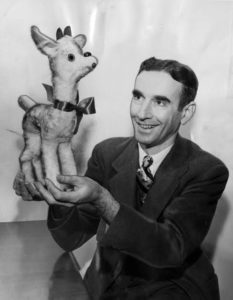Rudolph the Red-Nosed Reindeer
 Robert Lewis May (1905-1976) was born in Long Island, New York to a Jewish family, devoted members of the “Ethical Culture Society” which grew out of Reform Judaism. He studied psychology in Dartmouth College and was particularly drawn to the work of Alfred Adler, who suggested that the main drive of all human beings is to overcome inferiority and attain some sort of perfection. May went on to work as a copywriter and marketer for a number of department stores. The family lost everything during the Great Depression, and May’s wife was also battling cancer at the same time. In 1939, May’s boss at Montgomery Ward asked him to write some new promotional material for Christmas shoppers featuring a loveable animal character. May went to the zoo with his four-year-old daughter to get ideas, and eventually came up with Rudolph the Red-Nosed Reindeer, combining elements of the Ugly Duckling with his own difficult childhood as a Jewish kid, and the psychology of Alfred Adler. Although his wife tragically died as he was working on the book, he continued the project in her memory. The book became an instant classic and over 5 million copies were distributed over the next several years. In 1948, May reached out to his composer brother-in-law (former Jew of the Week) Johnny Marks to write music for a song adaptation. ‘Rudolph the Red-Nosed Reindeer’ was a hit, and is now the second most popular Christmas song of all time (after ‘White Christmas’). May went on to start a full-time Rudolph business, which he ran until 1958, before returning to work as a copywriter for Montgomery Ward. May wrote other children’s books, too, featuring characters like Benny the Bunny and Winking Willie. Meanwhile, Rudolph the Red-Nosed Reindeer went off to spawn numerous sequels, film adaptations, toys, and over 100 other products, and remains one of the most beloved Christmas characters today.
Robert Lewis May (1905-1976) was born in Long Island, New York to a Jewish family, devoted members of the “Ethical Culture Society” which grew out of Reform Judaism. He studied psychology in Dartmouth College and was particularly drawn to the work of Alfred Adler, who suggested that the main drive of all human beings is to overcome inferiority and attain some sort of perfection. May went on to work as a copywriter and marketer for a number of department stores. The family lost everything during the Great Depression, and May’s wife was also battling cancer at the same time. In 1939, May’s boss at Montgomery Ward asked him to write some new promotional material for Christmas shoppers featuring a loveable animal character. May went to the zoo with his four-year-old daughter to get ideas, and eventually came up with Rudolph the Red-Nosed Reindeer, combining elements of the Ugly Duckling with his own difficult childhood as a Jewish kid, and the psychology of Alfred Adler. Although his wife tragically died as he was working on the book, he continued the project in her memory. The book became an instant classic and over 5 million copies were distributed over the next several years. In 1948, May reached out to his composer brother-in-law (former Jew of the Week) Johnny Marks to write music for a song adaptation. ‘Rudolph the Red-Nosed Reindeer’ was a hit, and is now the second most popular Christmas song of all time (after ‘White Christmas’). May went on to start a full-time Rudolph business, which he ran until 1958, before returning to work as a copywriter for Montgomery Ward. May wrote other children’s books, too, featuring characters like Benny the Bunny and Winking Willie. Meanwhile, Rudolph the Red-Nosed Reindeer went off to spawn numerous sequels, film adaptations, toys, and over 100 other products, and remains one of the most beloved Christmas characters today.
Words of the Week
In the 1930s, antisemites declared, ‘Jews to Palestine’. Today they shout, ‘Jews out of Palestine’… They don’t want us to be there; they don’t want us to be here; they don’t want us to be.
– Amos Oz
